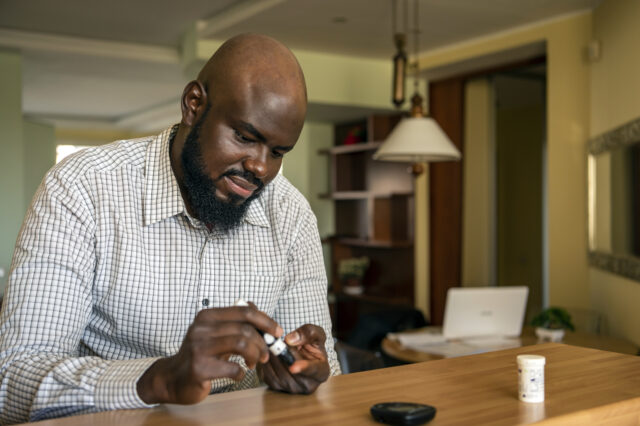Some in-home tests for average blood sugar levels less accurate than traditional method

A trio of in-home tests that measure average blood sugar levels in patients with diabetes are not as accurate as in-office screening methods, new research by University of Florida Health researchers and their colleagues shows.
The test, known as hemoglobin A1c or HbA1c, tracks patients’ average blood sugar levels in the past three months. As demand for telemedicine surged during the COVID-19 pandemic, so did the use of home HbA1c tests. But three commercial home-use tests fall short of the accuracy found in traditional in-person screening, the researchers found.
In a study involving 219 people with Type 1 or Type 2 diabetes, the researchers used an established benchmark for accuracy derived from the National Glycohemoglobin Standardization Program, or NGSP: In-home A1c results should be within 5% of the results from blood drawn from the vein for at least nine of every 10 samples. One of those home tests, known as Home Access, had 82% of its samples within 5% of the reference. Two other tests, A1cNow+ and CoreMedica, reached the benchmark in 46% and 29% of samples, respectively. The findings were published recently in the journal Diabetes Technology and Therapeutics.
“Unfortunately, the home kits are just not as accurate as we hoped,” said Laura M. Jacobsen, M.D., an assistant professor of pediatric endocrinology in the UF College of Medicine. “While we didn’t expect them to be 100% accurate, we were surprised at how low the accuracy was for some of them.”
A1c tests are typically used to determine medication changes and predict the risk of diabetic complications. Home Access and A1cNow+ are cleared by the U.S. Food and Drug Administration for home A1c measurement.
Accurate blood glucose measurements are crucial for people with diabetes because the figures help to guide medication dosing, such as for insulin, as well as lifestyle recommendations. An inaccurately high average blood glucose figure might encourage overuse of insulin while an inaccurate low reading might give patients a false sense of security about their current diabetes control. Thus, it is of importance to know which product has the least likelihood of providing falsely high or falsely low values and the overall highest accuracy.
Still, Jacobsen said there is value for patients in using one of the more accurate home A1c tests. Knowing their approximate A1c is good information to help patients stay on track. People with Type 2 diabetes, who are less likely to have continuous blood glucose monitors, can also benefit from the in-home tests.
“More information is always better for patients and providers,” she said. “It helps the patient because they’re not flying blind.”
Home A1c tests are also important as telemedicine becomes more of a fixture, Jacobsen said. Companies that developed the tests have done a great, groundbreaking service, she noted. Likewise, she expects the assays used in the home kits are continuously improving. For people in rural areas or those who can’t get to a doctor easily, the tests can still convey timely information.
“If they’re able to get an at-home test kit, the next discussion with their medical provider about diabetes will be much more productive,” Jacobsen said.
Collaborators included researchers from the Jaeb Center for Health Research, Rocky Mountain Clinical Research, Atlanta Diabetes Associates, Children’s Mercy Hospital (Kansas City, Missouri) and the University of Minnesota. Funding for the study was provided by the Leona M. and Harry B. Helmsley Charitable Trust.
Media contact: Doug Bennett at dougbennett@ufl.edu or 352-265-9400.
About the author
